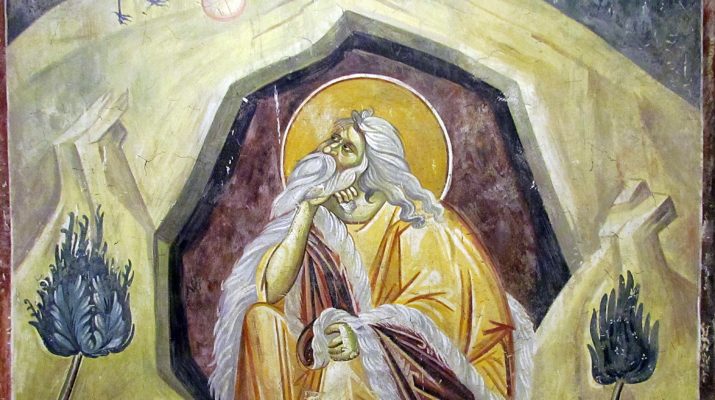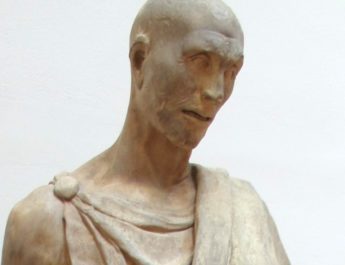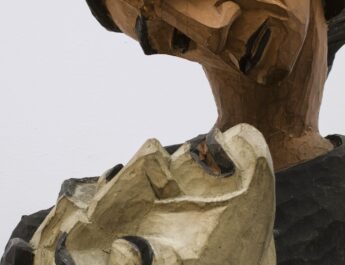1 Kings 19:9-18
Ordinary A37
BibleHub
9 At that place he came to a cave,A and spent the nightB there. CThen the wordD of the LordE came to him, saying, “What are you doing here, Elijah?”F
Notes on verse 9
A “cave” = mearah. Perhaps from ur (to be made naked, exposed, or bare). This is a cave, cavern, den, or hole.
B “spent the night” = lun. This is to stay somewhere, usually for the night. It can mean abide, dwell, or endure. By implication, it can mean staying somewhere permanently. Taken in a negative sense, this would mean obstinance, particularly verbal. So, it can also mean murmur, grudge, or complaining.
C {untranslated} = hinneh. From hen (lo! Behold! If, though; an expression of surprise). This is to draw attention, show suddenness or surprise, or to emphasize the importance of the coming statement. See! Lo! Behold!
D “word” = dabar. From dabar (to speak, declare, discuss). This is speech, a word, a matter, an affair, charge, command, message, promise, purpose, report, request. It is a word, which implies things that are spoken of in a wide sense.
E “Lord” = YHVH. From havah (to be, become) or hayah (to come to pass, become, be). This is the name of the God of Israel, the self-existent and eternal one, the tetragrammaton. This pronunciation has been lost to time so “Lord” is generally used in its place.
F “Elijah” = eliyyah. Related to “Lord” in v9. From el (God, a god) + yah (the shortened form of the name of the God of Israel; God, Lord); {from YHVH (see note E above)}. This is Elijah, “The Lord is God.”
10 He answered, “I have been very zealousG for the Lord, the GodH of hosts;I
Notes on verse 10a
G “been very zealous” = qanah + qanah. From qinah (zeal, jealousy). This is to be zealous or to provoke to jealousy. The word is repeated twice – the first time as an Infinitive Absolute. The Infinitive Absolute serves to emphasize the sentiment of the word. It is rather like Foghorn Leghorn’s speech pattern, “I said, I said.”
H “God” = Elohim. Related to “Elijah” in v9. From eloah (God, a god); from el (see note F above).
I “hosts” = tsaba. From tsaba (to wage war, serve, assemble, fight, perform, muster, wait on). This is a large group of persons (used figuratively for a group of things). It implies a campaign literally as with army, war, warfare, battle, company, soldiers. Can also be used figuratively for hardship or for worship.
for the IsraelitesJ have forsakenK your covenant,L thrown downM your altars,N
Notes on verse 10b
J “Israelites” = ben + yisrael. Literally “children of Israel.” From sarah (to persist, exert oneself, contend, persevere, wrestle, prevail) + el (God or god). This is God strives or one who strives with God; new name for Jacob and for his offspring. This refers to the people and to the land.
K “forsaken” = azab. To loosen, relinquish, permit, forsake, fail, leave destitute.
L “covenant” = berit. Perhaps from barah (to eat, choose, make clear); perhaps from bar (grain, wheat); from bara (to select, purify, cleanse, test, brighten, polish). This is a compact, covenant, alliance, treaty, or league.
M “thrown down” = haras. This is to break down, throw down, ruin, overthrow, or destroy. It is breaking down in pieces.
N “altars” = mizbeach. From zabach (this is to kill, slay, offer; slaughtering an animal to offer as a sacrifice). This is an altar.
and killedO your prophetsP with the sword.Q I aloneR am left,S and they are seekingT my life,U to take it away.”
Notes on verse 10c
O “killed” = harag. This is to strike with deadly intent so it can be kill, destroy, murder, or put to death.
P “prophets” = nabi. This is prophet, prophecy, speaker, or someone inspired.
Q “sword” = chereb. From charab (to attack, slay). This is any sharp instrument like a sword, dagger, axe, or mattock.
R “alone” = bad. From badad (to divide or be separated; alone, solitary, lonely, isolated, straggler). This is apart, alone, separation, body part, tree branch, except. It can also be a city’s chief.
S “am left” = yathar. This is to jut over, remain behind, preserve, to excel. It can be to leave or to be in abundance.
T “seeking” = baqash. This is to seek, ask, desire, or request. It can be any kind of searching. It can also mean to worship or pray – implies a striving for.
U “life” = nephesh. Related to naphash (to refresh or be refreshed). This is soul, self, person, emotion. It is a breathing creature. Can also refer to appetites and desires.
11 He said, “Go out and standV on the mountain beforeW the Lord,X for the Lord is about to pass by.”Y
Notes on verse 11a
V “stand” = amad. This is to stand up in a literal or figurative sense. So it can be establish, continue, endure, take a stand, act, be a servant, stand still, remain, stand against an enemy.
W “before” = paneh. Literally “before the face of.”
X {untranslated} = hinneh. Same as {untranslated} in v9. See note C above.
Y “pass by” = abar. This is to pass over or cross over. It is used for transitions, whether literal or figurative. It can also mean to escape, alienate, or fail. This is the root verb from which “Hebrew” is drawn.
Now there was a greatZ wind,AA so strongBB that it was splittingCC mountains and breaking rocksDD in piecesEE before the Lord, but the Lord was not in the wind; and after the wind an earthquake,FF but the Lord was not in the earthquake;
Notes on verse 11b
Z “great” = gadol. From gadal (to grow up, become great, become wealthy – to advance. The root meaning may be to twist in the sense of the process of growing). This is great, high, bigger, noble, old, marvelous. It can also refer to someone who is powerful or distinguished.
AA “wind” = ruach. This is breath, wind, air, cool, spirit. This is wind, which resembles the breath and so this can be used figuratively for life itself or being frail/mortal/impermanent. It can refer to the air of the sky or the spirit.
BB “strong” = chazaq. From chazaq (to strengthen, seize, be courageous, repair, bind, heal, conquer, harden). This is strong, hard, powerful, loud, bold, violent, impudent. It is usually strong in a negative sense.
CC “splitting” = paraq. 10x in OT. This is to tear apart, break off, drag away, or crunch. Figuratively, it can mean to deliver.
DD “rocks” = sela. Root may mean being lofty. This is a rock, cliff, crag, mountain. It could be used figuratively for obstinance or to show God as a refuge. It can also more generally mean fortress or stronghold.
EE “breaking…in pieces” = shabar. This is break, collapse, destroy, break in pieces, tear. It is bursting in a literal or figurative sense.
FF “earthquake” = raash. 17x in OT. From raash (to quake, shake, tremble, shake from fear; leap like a locust). This is quaking, shaking, rattling, or rumbling. It can also be commotion, tumult, earthquake, or confused sounds.
12 and after the earthquake a fire, but the Lord was not in the fire; and after the fire a soundGG of sheerHH silence.II 13 When Elijah heardJJ it, he wrapped his face in his mantleKK and went out and stood at the entrance of the cave.
LLThen there came a voiceMM to him that said, “What are you doing here, Elijah?”
Notes on verses 12-13
GG “sound” = qol. This is a sound, used often for human voices. Also used when God speaks or angels, animals or instruments. It can be a cry or a noise, thunder or earthquakes and so on.
HH “sheer” = daq. 15x in OT. From daqaq (to crush, crumble, make dust, be very small). This is thin, crushed, small, very little.
II “silence” = demamah. 3x in OT. From damam (to cease, be or become mute, silent, still, cut off, hold peace, be astonished, or die). This is silence, calm, quiet, whisper, or blowing.
JJ “heard” = shama. This is to hear, call, consent, or consider. It implies listening intelligently, giving attention, and, because of these two factors, obedience and action are often implied.
KK “mantle” = addereth. 12x in OT– this is the word used for the mantle that passes from Elijah to Elisha. From addir (majestic, excellent, mighty, powerful, or noble); from adar (wide, glorious, honorable, great, magnificent). This is something ample – glory, splendid, goodly. It could also refer to a cloak, robe, or garment.
LL {untranslated} = hinneh. Same as {untranslated} in v9. See note C above.
MM “voice” = qol. Same as “sound” in v12. See note GG above.
14 He answered, “I have been very zealous for the Lord, the God of hosts; for the Israelites have forsaken your covenant, thrown down your altars, and killed your prophets with the sword. I alone am left, and they are seeking my life, to take it away.”
15 Then the Lord said to him, “Go, returnNN on your wayOO to the wildernessPP of Damascus;QQ when you arrive, you shall anointRR HazaelSS as king over Aram.TT
Notes on verses 14-15
NN “return” = shub. To turn back, return, turn away – literally or figuratively. Doesn’t necessarily imply going back to where you started from. This is also the root verb for the Hebrew word for repentance “teshubah.”
OO “way” = derek. From darak (to tread, march, to walk. Can also mean affixing a string to a box since one needs to step on it to bend it in the process; so also an archer). This is a road as a thing that is walked on. Can be used figuratively for the path that one’s life takes or how one chooses to live one’s life.
PP “wilderness” = midbar. Related to “word” in v9. From dabar (see note D above). This is mouth or speech. It can also be desert or wilderness. Additionally, it can be used for a pasture to which one drives cattle.
QQ “Damascus” = dammeseq. From Old Aramaic dammasq (Damascus); perhaps related to d-r (dwelling) OR in Syriac darsuq (“a well-watered land”). This is Damascus. See https://en.wikipedia.org/wiki/Damascus.
RR “anoint” = mashach. This is smear, paint, spread, or paint. It can also be to rub with oil or, otherwise stated, to anoint. This implies a consecration. This root verb is where the word “messiah” comes from.
SS “Hazael” = chazael. Related to “Elijah” in v9. From chazah (to gaze at – to see or behold; perceiving as a mental process or looking at something with pleasure; seeing a vision) + el (see note F above). This is Hazael or Chazael, meaning “God sees.”
TT “Aram” = aram. Perhaps from ‘armon (any fortified building – castle, citadel, palace) OR from rum (to be high, rise, exalt self, extol, be haughty; to rise literally or figuratively). This is Aram, Syria, Mesopotamia – meaning elevated or citadel. See https://www.abarim-publications.com/Meaning/Aram.html#.XqfDX8hKhPY
16 Also you shall anoint JehuUU son of NimshiVV as king over Israel; and you shall anoint ElishaWW son of ShaphatXX of Abel-meholahYY as prophet in your place.
Notes on verse 16
UU “Jehu” = yehu. Related to “Lord” in v9. From YHVH (see note E above) + hu (he, she, it). This is Jehu, meaning “the Lord is he.”
VV “Nimshi” = nimshi. 5x in OT. Perhaps from mashah (to pull out in a literal or figurative sense, to draw out). This is Nimshi, perhaps meaning “extricated.”
WW “Elisha” = Elisha. Related to “Elijah” in v9 & “Hazael” in v15. From Elishua (Elishua, meaning “God is salvation”); {from el (see note F above) + yasha (to deliver, defend, help, preserve, rescue; properly, to be open, wide or free, which implies being safe. So, in a causative sense, this is to free someone)}. This is Elisha, meaning “God is salvation.”
XX “Shaphat” = shaphat. 8x in OT. From shaphat (to judge, defend, pronounce judgment, condemn, govern). This is Shaphat, meaning “he has judged” or “judge.”
YY “Abel-meholah” = abel mecholah. 3x in OT. From abel (meadow, plain – grassy) + mecholah (dancing, a company); {from machol (round dance); from chul (whirling around so dancing as in a circle or writhing in pain; used particularly for the pain of childbirth or from writhing due to fear; can also be falling in pain or waiting)} or {from machashabah (thought, scheme, imagination, purpose, or a plan either good or evil); from chashab (literally to weave; figuratively to think or plot something malicious)}. This is Abel-meholah or Abel Mecholah, meaning “meadow of dancing.”
17 Whoever escapesZZ from the sword of Hazael, Jehu shall kill; and whoever escapes from the sword of Jehu, Elisha shall kill. 18 Yet I will leave sevenAAA thousand in Israel, all the knees that have not bowedBBB to Baal,CCC and every mouth that has not kissedDDD him.”
Notes on verses 17-18
ZZ “escapes” = malat. This is to be smooth, which implies to escape as slipping away from. It can also be release, rescue, deliver, or preserve. It can be used specifically to meaning giving birth or making sparks.
AAA “seven” = sheba. This is seven or by sevenfold. It can also be used to imply a week or an indefinite number. Symbolically, this is the number of fullness, sacredness, perfection
BBB “bowed” = kara. This is to bow, crouch, kneel down, subdue. It is to bend the knee in many senses. It can also mean to smite, a woman crouching in childbirth, or bowing to worship God.
CCC “Baal” = baal. From the same as ba’al (lord, owner, ally, or archer); from ba’al (to marry, have dominion, be master). This is Baal, literally “lord,” a Phoenician god.
DDD “kissed” = nashaq. This is to kiss in a literal or figurative sense. It can mean to touch, rule, or equip with weapons.
Image credit: “Elijah, a Prophet and a Miracle Worker” from the Gračanica monastery.



